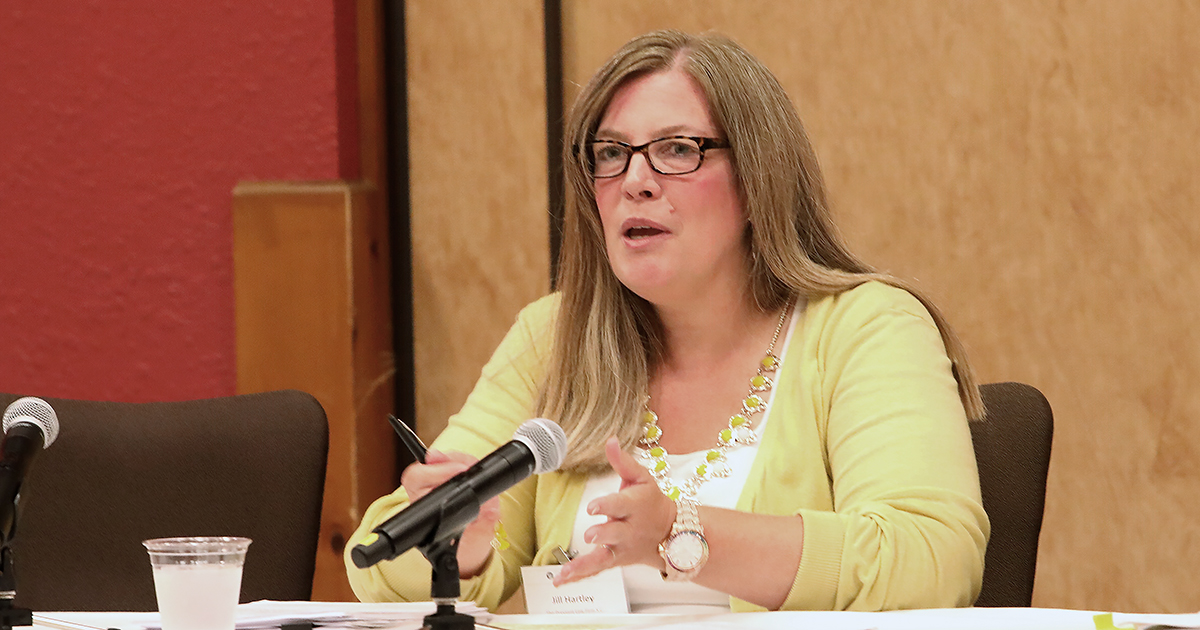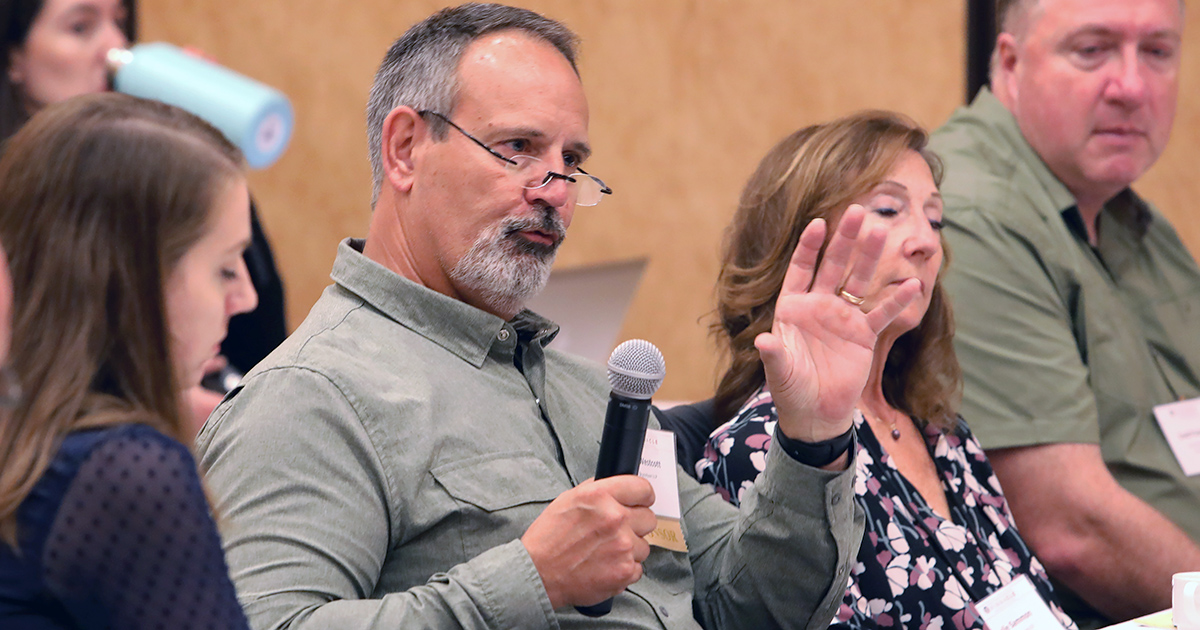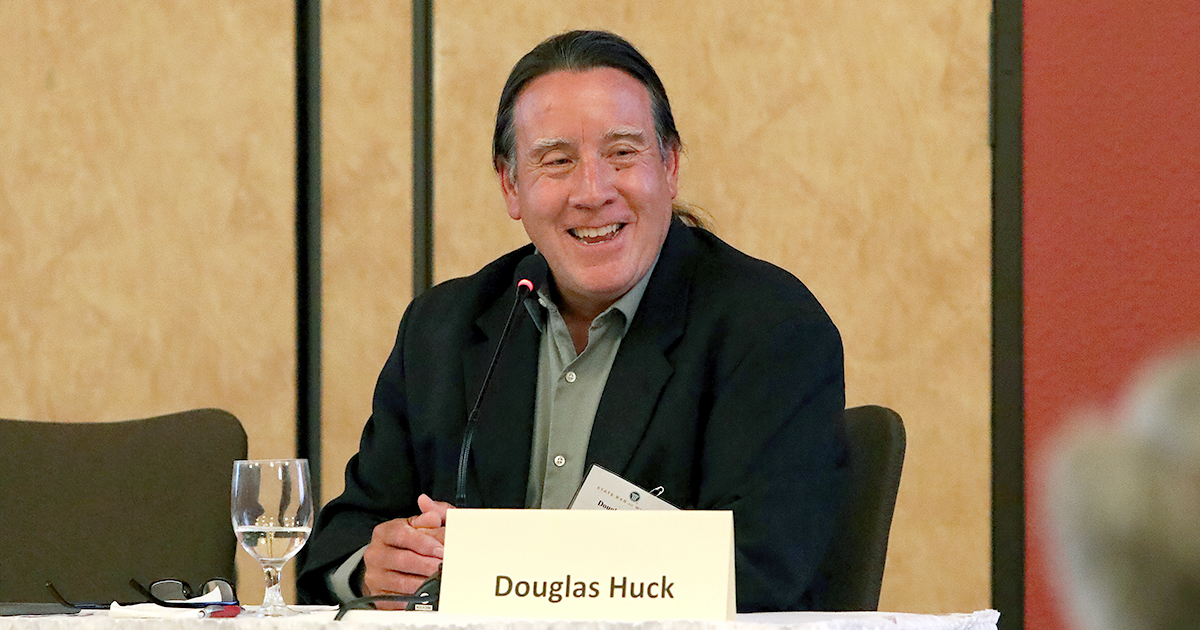
Jill Hartley discussed developments in labor law during the State Bar's annual Health, Labor, and Employment Law CLE on Aug. 19.
Aug. 23, 2022 – The State Bar of Wisconsin held the Health, Labor and Employment Law (HLE) Institute and the 10th annual Indian Law CLE program in-person this year, both at the Glacier Canyon Lodge at the Wilderness Resort in Wisconsin Dells on Aug. 18-19.
Post-Dobbs Landscape
During an HLE session held on Friday, Aug. 19, panelists surveyed the legal landscape created by the U.S. Supreme Court’s recent decision in
Dobbs v. Jackson Women’s Health Organization, 597 U.S. ___ (2022). The case overruled
Roe v. Wade and held that there is no federal constitutional right to an abortion.
The panelists agreed that the status of Wisconsin’s abortion statutes, including an 1858 law that prohibits abortion and a 1985 law that specifies that a woman may not be prosecuted for seeking an abortion, is unsettled.
 Jeff M. Brown is a legal writer for the State Bar of Wisconsin, Madison. He can be reached by
email or by phone at (608) 250-6126.
Jeff M. Brown is a legal writer for the State Bar of Wisconsin, Madison. He can be reached by
email or by phone at (608) 250-6126.
The uncertainty means that health care providers must juggle standards of care and ethical guidelines while avoiding criminal prosecution, licensure actions, and malpractice claims, all while attending to patient needs.
Additionally, health care providers must keep in mind limitations on coverage for legal representation in criminal proceedings, which are standard in most medical malpractice insurance policies, the panelists noted.
Panelists also discussed the validity of employee benefits related to abortion in the wake of the
Dobbs decision. In states that have banned abortion in the wake of
Dobbs, employers may no longer provide abortion benefits.
At the federal level, an executive order issued by President Joe Biden in July protects patient access to abortion medication (and contraception) and restricts the transfer of health data in an effort to fight abortion-related digital surveillance.
“Whatever the case, employers need to be aware of their obligations under state and federal laws related to leave for medical care, anti-discrimination laws, applicable labor laws … in addition to ensuring that the employer is cognizant of employees’ privacy rights,” said Sara J. Geenen.
Federal labor law also comes into play, said Geenen.
“Discussion among employees about petitioning the employee for abortion benefits … is protected activity under the National Labor Relations Act and the employee cannot be disciplined or retaliated against for engaging in that activity,” Geenen said.
Geenen said lawyers should be prepared for more changes as the legal system reacts to the
Dobbs decision. “They are coming,” Geenen said.

An attendee poses a question to a panelists during the State Bar's annual Health, Law, and Employment Institute on Aug. 19.
Big Changes in Labor Law
The labor law arena has also been marked by big changes lately.
Benjamin Mandelman, a Milwaukee-based lawyer with the National Labor Relations Board (NLRB) said the five-member board now has a Democratic majority. According to Mandelman the Democratic majority, along with a new general counsel appointed by President Biden last July, portends significant changes in labor policy.
Mandelman said that Biden’s appointment of Jennifer Abruzzo as general counsel was unprecedented.
Historically, Mandelman said, a new president allows the incumbent NLRB general counsel to serve out his or her term. But Biden fired the Republican general counsel and replaced him with an acting general counsel until Abruzzo was appointed and confirmed.
“Her agenda is not a secret,” Mandelman said. “[She] has identified 55 areas of law that she’s interested in changing.”
For instance, Mandelman said, Abruzzo has filed three cases seeking relief against employers under section 10(j) of the National Labor Relations Act, which authorizes the NLRB to seek a temporary injunction against unfair labor practices.
Mandelman said the pace of change in labor law occasioned by Abruzzo’s appointment makes it difficult for lawyers to advise their clients.
“There’s no certainty in any of this,” Mandelman said. “And for you to advise clients? I don’t know what you do.”
‘You Know it When You See it’
Madelman’s co-panelists, Jill Hartley, an employee-side lawyer with The Previant Law Firm, S.C., and Peter Albrecht, an employer-side lawyer with Godfrey & Kahn, S.C., discussed case law developments related to protected organizing activity among employees.
Shifting rubrics for analyzing the legality of protected organizing activity make it hard to advise employers, Albrecht said.
“Whenever we hear the phrase ‘totality of the circumstances,’ we know that there’s no predictability,” Albrecht said. “That phrase just means, ‘Who knows? You know it when you see it.’”
The panelists also discussed recent case law interpreting Section 7 of the National Labor Relations Act. That section entitles employees to engage in concerted activities for the mutual aid and protection.
One recent case decided by the NLRB held that a grocery store violated the law by disciplining employees for wearing Black Lives Matter buttons at work, because the Black Lives Matter movement is related to the terms and conditions of employment – specifically, economic inequality in the workplace.
Panelists also discussed rules for employee handbooks, settlements related to unfair labor practices, and labor-related interagency memoranda of agreement.
The HLE sessions were recorded and will be replayed during the week of Sept. 4 and the week of Oct. 2.
Indian CLE: Gaming, Mining, Wolves
During a session on gaming law held during the Indian Law CLE on Friday, Aug. 19, panelists discussed the advent of sports betting at tribal casinos in Wisconsin and the effect the pandemic had on casino operations.

Douglas Huck, a lawyer with the Forest County Potawatomi, dicussed ethical issues Indian Law during the State Bar's annual Indian Law CLE on Aug. 19.
According to Krystal John, a staff attorney with the Oneida Nation Law Office, the Oneida Nation formed relationships with data providers, integrity monitoring groups, and other vendors while it was negotiating with state to offer sports betting at its casino in Green Bay. That allowed the nation to impress upon vendors the importance of retaining gaming customers before the casino began to offer sports betting.
“Make sure your vendor understands that your customers must remain your own,” John said. “There are some vendors who, when customers sign up with them for mobile wagering, they’re converted to [the vendor’s] customer. That was the most important thing for us – making sure these vendors understood what we wanted.”
According to John, 90% of sports bets placed at the Oneida Casino were placed on-site.
“Without comprehensive mobile wagering, mobile is not really successful,” John said.
Erik Shircel, a tribal attorney with the Ho-Chunk Nation Department of Justice, said the onset of the pandemic spotlighted legal issues that tribes hadn’t considered before. For instance, which sovereign is responsible for health regulations on trust lands?
According to Shircel, the Ho-Chunk Nation had no ordinances that were broadly applicable to isolation, masking, or quarantines.
As a result, the nation amended its employment law seven times in 2020 to address employment-related situations related to the closure of nation’s gaming facilities in Madison, Wisconsin Dells, Black River Falls, Tomah, Wittenberg, and Nekoosa.
The pandemic closures forced the nation’s lawyers to scrutinize the force majeure clauses in its vendor contracts, Shircel said.
“Until this time, for me a force majeure clause was just boilerplate,” Shircel said. “It was surprising how many of our vendors were just sending us force majeure notices before we even had a chance to look at everything.”
De-listing Triggered Hunt
During a session held on Thursday morning, Aug. 18, Doug Cox, director of land management for the Menominee Indian Tribe, discussed the tribe’s efforts to oppose the Back 40 Mine.
The Back 40 Mine is a 2,000-foot-wide mine in Michigan’s Upper Peninsula at the headwaters of the Menominee River, a site with significant cultural importance for the tribe. Cox said the proposed mine also threatens water quality and fish and wildlife.
Efforts to oppose the mine have led to federal litigation and contested case hearings before state agencies in Michigan.
In an afternoon session on Aug. 18, Jessica Blome, a shareholder with Greenfire Law PC in Berkeley, Calif., discussed tribal challenges to the Wisconsin wolf hunt statute.
The statute kicked in when the U.S. Fish and Wildlife Service de-listed the gray wolf under the federal Endangered Species Act in early 2021. The inaugural wolf hunt reduced the Wisconsin wolf population of 700 by 30% in two-and-a-half days, Blome said.
The gray wolf has since been relisted under the terms of federal court ruling out of California, Blome said.
Who is Your Client?
During a session on Aug. 19, Aviva Kaiser, ethics counsel with the State Bar of Wisconsin, and Douglas Huck, a lawyer with the Forest County Potawatomi, discussed the challenges faced by tribal lawyers when determining who their client is.
The challenge is one shared by any government lawyer who represents a department, agency, or other collective body, Kaiser said.
“We have to ask, ‘Who’s the client and who’s the decision-maker for the client?” Kaiser said. “Those two may be different.”
Huck said that tribal attorneys must be careful about forming attorney-client relationships with tribal officials.
“You’ll get a manager or an employee come in,” Huck said. “They don’t tell you the whole story, they just tell you want they want you to hear and then later you’ll learn that there’s a lot more to it.
“But then that person will go off and take whatever was talked about as ‘Legal said…’ and use it as a weapon. Those who practice in-house have to be careful with our words.”
Huck said that having proper ethical guidelines in place and following them is key to avoiding problems in that scenario.
Huck faced a twist on that scenario when he went from being an in-house lawyer with the Stockbridge-Munsee Band of Mohican Indians to a member of the tribe’s elected council.
“It’s my former client but now I’m one of the decision-makers,” Huck said. “The State Bar was very, very helpful with that.
“Tim Pierce just point-blank said, ‘Doug, if you worked on anything that comes before you, just recuse yourself. You don’t have to vote. That was great advice.”
